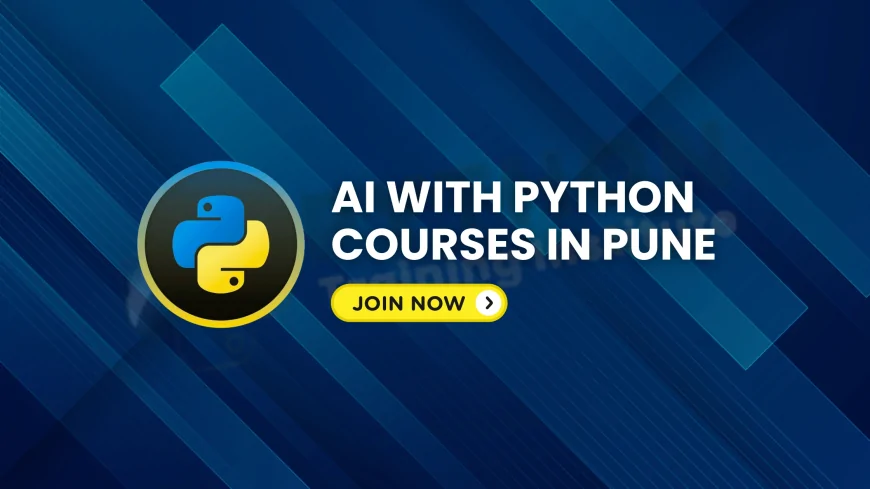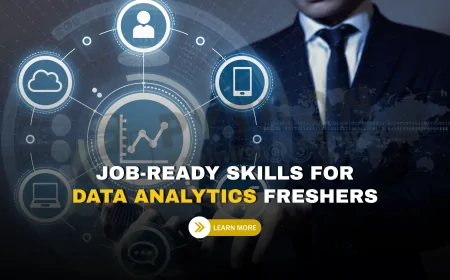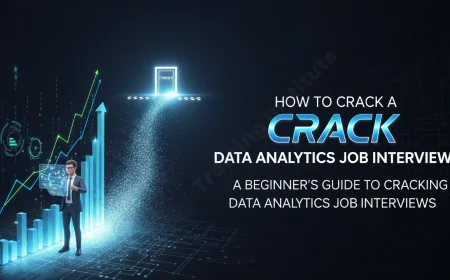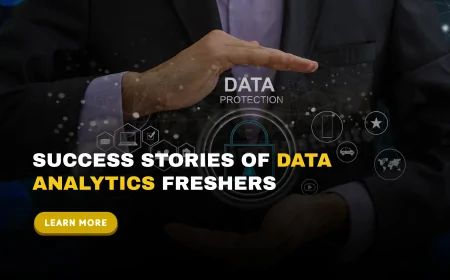AI Development Using Python – Best Courses in Pune | Best Training Institutes for Python Development in Pune
Explore the best AI development courses using Python in Pune. Learn from expert trainers, gain hands-on project experience, and become job-ready in AI and machine learning with top-rated Python training institutes.

Table of Contents
- Introduction
- Why Python for AI Development?
- Why Pune Is an AI-Education Hotspot
- Popular Course Formats
- Key Modules & Technologies Covered
- Top Training Providers in Pune
- Typical Fees, Duration & Scheduling
- Certifications & Accreditation
- Job Market & Career Paths
- Industry Collaborations & Internships
- Online vs Offline Learning
- Who Should Enrol? Prerequisites Explained
- Emerging Trends in AI Development
- Supplementary Learning Resources
- Success Stories from Pune Learners
- How to Choose the Right Course
- Study Tips to Maximise ROI
- Frequently Asked Questions (20)
- Conclusion
1. Introduction
Pune has evolved from a university town into one of India’s foremost technology hubs, boasting a vibrant ecosystem of IT parks, start-ups, research labs, and multinational R&D centres. With artificial intelligence (AI) projected to add $15 trillion to the global economy by 2030, the city’s training providers have rushed to create future-proof programs that blend Python programming with machine learning (ML), deep learning (DL), natural-language processing (NLP), and MLOps.
This guide curates the best AI-development-with-Python courses in Pune—comparing curricula, faculty, fees, placement records, and unique value propositions—so you can pick the program that fits your goals, budget, and schedule.
2. Why Python for AI Development?
- Readable syntax: Lets you focus on algorithms rather than boilerplate.
- Rich library ecosystem:
NumPy,Pandas,Scikit-learn,TensorFlow,PyTorch,Keras. - Community & support: 3.2 million GitHub repos tagged “python-ml”.
- Interoperability: Bindings to C/C++, Java, Spark, and cloud APIs.
- Career mobility: Skills port to data engineering, DevOps, web back-ends.
3. Why Pune Is an AI-Education Hotspot
Pune offers an unbeatable mix of academic pedigree (IISER, COEP Technological University, Symbiosis Institute of Technology), corporate R&D (TCS Research, NVIDIA, Persistent AI), and a start-up scene spanning fintech, health-tech, and industrial IoT. Government initiatives—such as MSInS grants and Pune Smart City—pump funds into AI adoption, driving demand for skilled developers and, by extension, high-quality training providers.
4. Popular Course Formats
| Format | Duration | Best For |
|---|---|---|
| Intensive Bootcamp | 6–12 weeks | Fast-track career-switchers |
| Post-Graduate Diploma | 6–12 months | Fresh grads seeking depth + internship |
| Weekend Cohort | 12–24 weeks | Working professionals |
| One-on-One Mentorship | Custom | Founders, researchers, niche projects |
| Corporate Upskilling | 2–8 weeks onsite | Enterprise teams modernising stacks |
5. Key Modules & Technologies Covered
- Python Essentials: OOP, data structures, virtual environments.
- Math for AI: Linear algebra, calculus, probability.
- Machine Learning: Regression, classification, ensemble methods.
- Deep Learning: CNNs, RNNs, transformers with TensorFlow/PyTorch.
- NLP: Tokenisation, word-embeddings, LLM fine-tuning.
- Computer Vision: OpenCV, YOLO, image augmentation.
- MLOps: Docker, Kubernetes, CI/CD, model monitoring.
- Cloud Deployment: AWS SageMaker, GCP Vertex AI, Azure ML.
- Capstone Project: End-to-end pipeline from data ingestion to API serving.
6. Top Training Providers in Pune
The city hosts 40+ institutes; the following have consistently high learner satisfaction and placement rates:
- Webasha Technologies: Project-oriented curriculum, Kaggle-style hackathons, and one-year LMS access.
7. Typical Fees, Duration & Scheduling
- Bootcamps: ₹35 000 – ₹65 000 (8–12 weeks, 120–180 contact hours).
- PG Diplomas: ₹1.25 L – ₹2.4 L (9–12 months including internship).
- Weekend Cohorts: ₹55 000 – ₹90 000 (6 months, Sat–Sun 6 h/week).
- One-on-One Mentoring: ₹1 000 – ₹1 800 per hour (package deals available).
- Corporate Upskilling: Negotiated (₹4 000 – ₹6 000 per employee for 40 h).
8. Certifications & Accreditation
Many courses prepare you for globally recognised exams such as:
- TensorFlow Developer Certificate
- Microsoft Azure AI Engineer (AI-102)
- Google Professional ML Engineer
- IBM Applied AI Professional Certificate
Accredited programs (Great Learning, UpGrad, MIT-WPU) also carry university credits—valuable if you plan to pursue an MS or MBA abroad.
9. Job Market & Career Paths
Hiring demand in Pune spans sectors:
- IT Services & Consulting
- TCS, Infosys, Cognizant seek ML engineers for client projects.
- Product Start-ups
- Mad Street Den, DeepMind’s India labs, and numerous SaaS ventures.
- Automotive & Manufacturing
- Bajaj Auto, John Deere—predictive maintenance & robotics.
- FinTech & InsurTech
- Paysense, ReBIT—fraud detection, credit scoring models.
Entry-level AI developers earn ₹5–7 LPA, while senior ML engineers with MLOps skills can cross ₹18 LPA.
10. Industry Collaborations & Internships
Reputed institutes offer:
- Co-branded hackathons with NVIDIA’s Deep Learning Institute.
- Corporate capstones (e.g., sentiment analysis for ICICI Bank).
- Paid internships lasting 8–16 weeks at partner start-ups.
11. Online vs Offline Learning
Online courses give flexibility, recordings, and global mentors, but require self-discipline. Offline labs provide high-performance GPUs, peer learning, and immediate TA support. Hybrid models (weekend in-person labs + weekday online theory) are increasingly popular.
12. Who Should Enrol? Prerequisites Explained
- Comfort with basic programming (any language).
- High-school mathematics (matrices, functions, probability).
- Eagerness to spend 6–10 h/week on coding assignments.
Non-programmers can start with a 2-week Python primer before diving into AI modules.
13. Emerging Trends in AI Development
- Generative AI: Fine-tuning large language & diffusion models locally.
- Edge AI: Deploying models on Raspberry Pi and NVIDIA Jetson.
- Responsible AI: Bias mitigation, explainability dashboards (SHAP, LIME).
- MLOps 2.0: Model observability, feature stores, automated retraining.
- Low-Code/No-Code Tools: AutoML, but still require Python glue scripts.
14. Supplementary Learning Resources
- Meet-ups: PyData Pune, Google Developers Group ML.
- Hackathons: Smart India Hackathon, COEP TechFest AI Challenge.
- Open-Source: Contribute to Scikit-learn, Hugging Face Transformers.
- Books: Hands-On ML with Scikit-learn, Keras & TensorFlow by Aurélien Géron.
- YouTube Channels: Corey Schafer, StatQuest, Sentdex.
15. Success Stories from Pune Learners
Ishita Deshmukh pivoted from civil engineering to an NLP engineer role at TCS Research after completing Webasha’s AI bootcamp and publishing a Hindi sentiment-analysis model on Hugging Face.
Sahil Jagtap landed a ₹12 LPA MLOps role at Persistent after DataMites’ PG program, where he containerised a computer-vision model for defect detection.
16. How to Choose the Right Course
- Clarify career goal: researcher vs engineer vs product manager.
- Audit sample lectures and syllabus depth.
- Check GPU hours & project mentorship quality.
- Scrutinise placement data and alumni LinkedIn profiles.
- Factor in total cost of ownership—hardware, cloud credits, travel.
17. Study Tips to Maximise ROI
- Schedule daily coding sprints instead of marathon weekends.
- Re-implement famous papers (ResNet-50, BERT) from scratch to grasp internals.
- Blog your learnings on Medium; teaching reinforces mastery.
- Form peer-review pods for code critiques.
- Track progress with a “30-day model-a-day” GitHub challenge.
Frequently Asked Questions (FAQs)
1. Do I need a CS degree to enrol in an AI-with-Python course?
No, many learners come from mechanical, civil, or commerce backgrounds. Basic programming logic is sufficient.
2. Which Python version should I learn for AI?
Python 3.10+ is recommended because new libraries drop support for 3.6 and earlier.
3. How much math is required?
Comfort with linear algebra, calculus basics, and probability will help, but most courses teach math intuition alongside code.
4. Can I get a job immediately after a 3-month bootcamp?
If you build a strong portfolio (2–3 well-documented projects) and practise interview questions, yes—entry-level ML roles are attainable.
5. What salary range can fresh AI developers in Pune expect?
₹5–7 lakh per annum for junior roles; higher if you already have domain expertise.
6. Are GPUs mandatory for course projects?
For deep-learning modules, yes. Institutes provide lab access or free cloud credits (Google Colab, Kaggle, AWS).
7. What is the difference between machine learning and deep learning?
ML covers a broad set of algorithms (regression, trees, SVM), while DL deals with multi-layer neural networks that learn representations automatically.
8. Which framework is in higher demand—TensorFlow or PyTorch?
PyTorch dominates research; TensorFlow is still common in enterprise. Most courses teach both.
9. Will the course cover data engineering topics?
Comprehensive diplomas often include Spark, Airflow, and feature-store design.
10. How are students assessed?
Through quizzes, case studies, and a capstone evaluated by industry mentors.
11. Do institutes offer EMI or loan facilities?
Yes, many partner with financing companies like Propelld or Eduvanz.
12. Are placement guarantees genuine?
Read the fine print—guarantees usually mean refund if you meet eligibility criteria and still remain unplaced.
13. Can I pursue higher studies abroad after completing a Pune AI diploma?
PG diplomas with university credits (MIT-WPU, IIIT-B) ease MS admissions.
14. Is freelancing viable after finishing the course?
Yes—upwork gigs for data cleaning, model training, or API deployment pay $15–30 /hr.
15. Will I learn about generative AI and LLM fine-tuning?
Top-tier 2025 curricula now include prompt engineering, LoRA fine-tuning, and model evaluation metrics (BLEU, ROUGE).
16. How big are typical class sizes?
Bootcamps: 20–30; PG diplomas: 40–60; One-on-one mentoring is obviously 1.
17. Can non-coding managers benefit from these courses?
Some institutes offer “AI for Product Managers” tracks focusing on scoping and ROI rather than code.
18. Are there women-only cohorts?
Yes—initiatives like TechHer Pune run all-female weekend batches with mentorship support.
19. Will the course help me crack AI interviews?
Mock interviews, coding challenges, and HR prep sessions are commonly included.
20. Does the certificate expire?
Institutional certificates do not; vendor exams (e.g., Azure AI-102) may require renewal after two years.
18. Conclusion
AI is no longer a buzzword—it powers recommendation engines, fraud detection, autonomous vehicles, and breakthrough scientific research. Pune’s unique blend of academic rigour and industry demand makes it the ideal launchpad for an AI career. By choosing a Python-centric AI program that balances theory with real-world projects, you can acquire the competence—and confidence—to ship production-ready models and accelerate your professional growth.
What's Your Reaction?
 Like
0
Like
0
 Dislike
0
Dislike
0
 Love
0
Love
0
 Funny
0
Funny
0
 Angry
0
Angry
0
 Sad
0
Sad
0
 Wow
0
Wow
0















